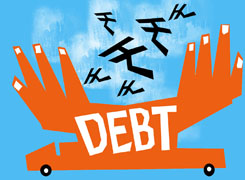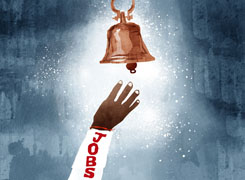Debt-ridden: How can I clear my dues with EMIs exceeding my income and no balance transfer?
Ramalingam Kalirajan |9757 Answers |Ask -Follow
Mutual Funds, Financial Planning Expert - Answered on Sep 04, 2024
He has an MBA in finance from the University of Madras and is a certified financial planner.
He is the director and chief financial planner at Holistic Investment, a Chennai-based firm that offers financial planning and wealth management advice.... more

Hi sir, I am overwhelmed with debt. I have multiple loans and outstanding credit card balances, and my income is only ?60,000 per month. I don't have any savings, and my total debt is nearly ?10 lakh. I’m struggling to understand how to clear it since my EMIs exceed my income, and no lending partner is willing to offer a balance transfer. I really want to get out of this financial mess
Prioritizing Debts for Repayment
List Your Debts: Make a detailed list of all your outstanding loans and credit card balances. Note down the interest rates, EMI amounts, and due dates for each debt.
Identify High-Interest Debts: Credit card balances typically have the highest interest rates. These should be your priority as they accumulate the most interest over time.
Focus on Clearing High-Interest Debt: Allocate any extra money towards the debt with the highest interest rate. Even a small extra payment can reduce the total interest you'll pay.
Evaluating Your Monthly Budget
Review Your Expenses: Break down your monthly expenses. Identify non-essential expenses that can be reduced or eliminated temporarily. This might involve cutting back on dining out, subscriptions, or other discretionary spending.
Increase Income if Possible: Consider ways to increase your income. This could be through a part-time job, freelancing, or selling items you no longer need. Every bit helps in reducing debt faster.
Automate Savings: Even though you don’t have savings now, start small. Automate a small amount to a savings account each month. This will help create a cushion for emergencies.
Negotiating with Lenders
Communicate with Your Lenders: Don’t hesitate to reach out to your lenders. Explain your situation and request a lower interest rate or extended repayment period. Some lenders may offer hardship programs or be willing to renegotiate terms.
Explore Debt Consolidation: Although you mentioned no lending partner is willing to offer a balance transfer, you might consider a debt consolidation loan from a peer-to-peer lender or credit union. This can lower your overall interest rate and simplify your repayments.
Avoiding New Debt
Stop Using Credit Cards: Until you’re in a better financial position, avoid using credit cards. This prevents adding more debt and helps you focus on paying off existing balances.
Delay Major Purchases: Postpone any major purchases until your debt is under control. Focus on clearing your existing obligations before taking on any new financial commitments.
Creating a Debt Repayment Plan
Debt Snowball Method: If high-interest debts are too overwhelming, consider the debt snowball method. Start by paying off the smallest debt first. Once cleared, move to the next smallest debt. This method can boost your morale as you see debts disappearing.
Debt Avalanche Method: If you can focus on high-interest rates, use the debt avalanche method. Pay off debts with the highest interest rate first. This reduces the total interest paid over time.
Automate Payments: Set up automatic payments for your EMIs. This ensures you never miss a payment and helps avoid late fees and penalties.
Seeking Professional Help
Certified Financial Planner (CFP): Consider consulting a Certified Financial Planner. They can help you develop a personalized plan to manage your debts, improve cash flow, and create a sustainable budget.
Debt Counselling Services: Some non-profit organizations offer debt counselling. They can negotiate with creditors on your behalf and help you set up a repayment plan.
Managing Stress
Focus on Your Health: Financial stress can take a toll on your health. Ensure you are eating well, exercising, and taking time to relax. Managing your stress levels is crucial to making clear decisions.
Stay Positive: Clearing debt is a long journey, but it is achievable. Celebrate small victories along the way, and keep your end goal in mind.
Final Insights
Stick to the Plan: Consistency is key in managing debt. Stick to your repayment plan, even if progress feels slow. Over time, your efforts will pay off.
Plan for the Future: Once your debt is under control, start building an emergency fund. This will prevent you from falling into debt again in the future.
Avoid Debt Traps: Be cautious of taking on new debt once you’ve cleared your current obligations. Focus on saving and investing instead.
Your situation, though difficult, is not without hope. By taking these steps and remaining disciplined, you can gradually clear your debt and regain financial stability.
Best Regards,
K. Ramalingam, MBA, CFP
Chief Financial Planner
www.holisticinvestment.in
You may like to see similar questions and answers below
Ramalingam Kalirajan |9757 Answers |Ask -Follow
Mutual Funds, Financial Planning Expert - Answered on May 02, 2024
Ramalingam Kalirajan |9757 Answers |Ask -Follow
Mutual Funds, Financial Planning Expert - Answered on Jun 11, 2024
Ramalingam Kalirajan |9757 Answers |Ask -Follow
Mutual Funds, Financial Planning Expert - Answered on Jun 19, 2024
Ramalingam Kalirajan |9757 Answers |Ask -Follow
Mutual Funds, Financial Planning Expert - Answered on Jun 01, 2025
Sushil Sukhwani |614 Answers |Ask -Follow
Study Abroad Expert - Answered on Jul 16, 2025
Archana Deshpande |116 Answers |Ask -Follow
Image Coach, Soft Skills Trainer - Answered on Jul 16, 2025
Nayagam P P |8910 Answers |Ask -Follow
Career Counsellor - Answered on Jul 16, 2025
Nayagam P P |8910 Answers |Ask -Follow
Career Counsellor - Answered on Jul 16, 2025
Archana Deshpande |116 Answers |Ask -Follow
Image Coach, Soft Skills Trainer - Answered on Jul 16, 2025
Nayagam P P |8910 Answers |Ask -Follow
Career Counsellor - Answered on Jul 16, 2025
Dr Nagarajan J S K |1810 Answers |Ask -Follow
NEET, Medical, Pharmacy Careers - Answered on Jul 16, 2025
Dr Nagarajan J S K |1810 Answers |Ask -Follow
NEET, Medical, Pharmacy Careers - Answered on Jul 16, 2025
Dr Nagarajan J S K |1810 Answers |Ask -Follow
NEET, Medical, Pharmacy Careers - Answered on Jul 16, 2025
Nayagam P P |8910 Answers |Ask -Follow
Career Counsellor - Answered on Jul 16, 2025
























